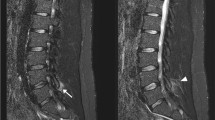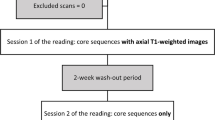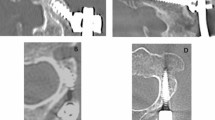Abstract
Study design
A retrospective study of computed tomography (CT) myelographic images in patients with degenerative lumbar spinal stenosis (LSS).
Objectives
To introduce a new technique for the quantitative evaluation of LSS.
Background
Advances in hardware and software technology now permit inexpensive digitalization of radiological images, and enable methodologies for quantifying space available for neural elements in spinal canal. However, a valid method with quantitative evaluation of spinal stenosis in living patients has not been developed yet.
Methods and materials
Preoperative CT myelographic scans of 50 patients with degenerative LSS were collected for retrospective investigation. The patients subsequently underwent lumbar decompressive surgery. They included scans from thoracic vertebra 12 (T12) to sacrum (S1), in which each segment was scanned through both the vertebral body and disk. All CT scan films were digitized using a high-resolution digital camera. ImageTool™ software was used to measure three parameters: cross-sectional area of dural sac at disk level (A), cross-sectional area of spinal canal at midpedicular level (B), and cross-sectional area of vertebral body (C). The dural sac canal ratio (DSCR) was calculated as A/B×100%. Low DSCR implied severe dural sac compression with a high degree of stenosis. The spinal canal vertebral ratio (CVR) was also calculated as B/C×100%. Low CVR implied a low baseline of canal capacity for neural elements. They were calculated from T12 to S1.
Results
The study consisted of 26 male and 24 female patients, with an average age of 68.4 (35–97) years. A total of 295 segments were evaluated, of which 118 (40%) were surgically decompressed. There were wide ranges of canal cross-sectional areas (140–475 mm2) and dural sac cross-sectional area (54–435 mm2). Male patients had a slightly larger canal cross-sectional area than female patients at each level. The mean CVR was found decreased from T12 (26.1%) to L4 (18.3%). This was higher in female than in male patients, especially from T12 to L2 (P < 0.01). There were significant correlations between spinal canal and dural sac cross-sectional area (r = 0.55, P < 0.001), and also between CVR and DSCR (r = 0.31, P < 0.001). Of the levels decompressed, 82% was performed from the level L2 to L5, in which there was no significant difference in canal cross-sectional area and CVR between decompression and nondecompression (P > 0.05). There was a good correspondence between decreasing mean DSCR and increasing percentile of levels decompressed.
Conclusion
DSCR represents a useful method for the quantitative diagnosis of lumbar spinal canal stenosis. ImageTool™ software is a useful tool in measuring spinal morphometry.
Similar content being viewed by others
References
Airaksinen O, Herno A, Turunen V, Saari T, Suomlainen O (1997) Surgical outcome of 438 patients treated surgically for lumbar spinal stenosis. Spine 22:2278–2282
Amundsen T, Weber H, Lilleas F, Nordal HJ, Abdelnoor M, Magnaes AB (1995) Lumbar spinal stenosis: Clinical and radiologic features. Spine 20:1178–1186
Bolender NF, Schönström NS, Spengler DM (1985) Role of computed tomography and myelography in the diagnosis of central spinal stenosis. J Bone Jt Surg [Am] 67:240–246
Ciol MA, Deyo RA, Howell E, Kreif SK (1996) An assessment of surgery for spinal stenosis: time trends, geographic variations, complications, and reoperations. J Am Geriatr Soc 44:285–290
Drew R, Bhandari M, Kulkarni AV, Louw D, Reddy K, Dunlop B (2000) Reliability in grading the severity of lumbar spinal stenosis. J Spinal Disord 13(3):253–258
Eisenstein S (1983) Lumbar vertebral canal morphometry for computerized tomography in spinal stenosis. Spine 8(2):187–191
Eisenstein S (1977) The morphometry and pathological anatomy of the lumbar spine in South African negroes and caucasoids with specific reference to spinal stenosis. J Bone Jt Surg Br 59(2):173–180
Eisenstein S (1980) The trefoil configuration of the lumbar vertebral canal. A study of South African skeletal material. J Bone Jt Surg Br 62-B(1):73–77
Fang D, Cheung KM, Ruan D, Chan FL (1994) Computed tomographic osteometry of the Asian lumbar spine. J Spinal Disord 7(4):307–316
Herno A, Airaksinen O, Saari T, et al. (1999) Computed Tomography findings 4 years after surgical management of lumbar spinal stenosis. Spine 24:2234–2239
Herno A, Airaksinen O, Saari T (1994) Computed tomography after laminectomy for lumbar spinal stenosis: patients' pain pattern, walking capacity, and subjective disability had no correlation with computed tomography findings. Spine 19:1975–1978
Hitselberger WE, Witten RM (1968) Abnormal myelograms in asymptomatic patients. J Neurosurg 28:204–206
Hu RW, Jaglal S, Axcell T, Anderson G (1997) A population-based study of reoperations after back surgery. Spine 22:2263–2271
Johnsson KE, Rosen I, Uden A (1992) The natural course of lumbar spinal stenosis. Clin Orthop Rel Res 279:82–86
Jonsson B, Annertz M, Sjoberg C, Stromqvist B (1997) A prospective and consecutive study of surgically treated lumbar spinal stenosis: Part II. Five-year follow-up by and independent observer. Spine 22:2938–2944
Katz JN, Lipson SJ, Chang LC, Levine SA, Fossel AH, Liang MH (1996) Seven- to ten-year outcome of decompressive surgery for degenerative lumbar spinal stenosis. Spine 21:92–98
Katz JN, Lipson SJ, Lew RA, et al. (1997) Lumbar laminectomy alone or with instrumented or noninstrumented arthrodesis in degenerative lumbar spinal stenosis: patient selection, costs, and surgical outcomes. Spine 22:1123–1131
Katz JN, Stucki G, Lipson SJ, et al. (1999) Predictors of surgical outcome in degenerative lumbar spinal stenosis. Spine 24:2229
Kent DL, Haynor DR, Larson EB, Deyo RA (1992) Diagnosis of lumbar spinal stenosis in adults: a metaanalysis of the accuracy of CT, MR, and myelography. AJR Am J Roentgenol 158(5):1135–1144
Kornberg M, Rechtine GR (1985) Quantitative assessment of the fifth lumbar spinal canal by computed tomography in symptomatic L4–L5 disc disease. Spine 10(4):328–330
Mariconda M, Zanforlino G, Celestino GA, Brancaleone S, Fava R, Milano C (2000) Factors influencing the outcome of degenerative lumbar spinal stenosis. J Spinal Disord 13(2):131–137
Oland G, Hoff TG (1996) Intraspinal cross-sectional area measured on myelography-computed tomography. Spine 21:1985–1989
Papp T, Porter RW, Craig CE, et al. (1997) Significant antenatal factors in the development of lumbar spinal stenosis. Spine 22:1805–1810
Postacchini F, Ripani M, Carpano S (1983) Morphometry of the lumbar vertebrae. An anatomic study in two caucasoid ethnic groups. Clin Orthop 172:296–303
Schonstrom N, Willen J (2001) Imaging of low back pain II. Imaging lumbar spinal stenosis. Radiol Clin North Am 39(1):31–53
Schönström NSR, Bolender NF, Spengler DM, Hansson T (1984) Pressure changes within the cauda equina following constriction of the dural sac. An in vitro experimental study. Spine 9:49–52
Schönström NSR, Bolender NF, Spengler DM (1985) The pathomorphology of spinal stenosis as seen on CT scans of the lumbar spine. Spine 10:806–811
Silvers HR, Lewis PJ, Asch HL (1993) Decompressive lumbar laminectomy for spinal stenosis. J Neurosurg 78:695–701
Turner JA, Ersek M, Herron L, Deyo R (1992) Surgery for lumbar spinal stenosis: attempted meta-analysis of the literature. Spine 17:1–8
Ullrich CG, Binet EF, Sanecki MG, Kieffer SA (1980) Quantitative assessment of the lumbar spinal canal by computed tomography. Radiology 134(1):137–143, Jan
Zheng F, Sandhu HS, Cammisa PF, Girardi PF, Khan SN (2001) Predictors of functional outcome in elderly patients undergoing posterior lumbar spine surgery. J Spinal Disord 14:518–521
Author information
Authors and Affiliations
Corresponding author
Rights and permissions
About this article
Cite this article
Zheng, F., Farmer, J.C., Sandhu, H.S. et al. A Novel Method for the Quantitative Evaluation of Lumbar Spinal Stenosis. HSS Jrnl 2, 136–140 (2006). https://doi.org/10.1007/s11420-006-9006-3
Published:
Issue Date:
DOI: https://doi.org/10.1007/s11420-006-9006-3




